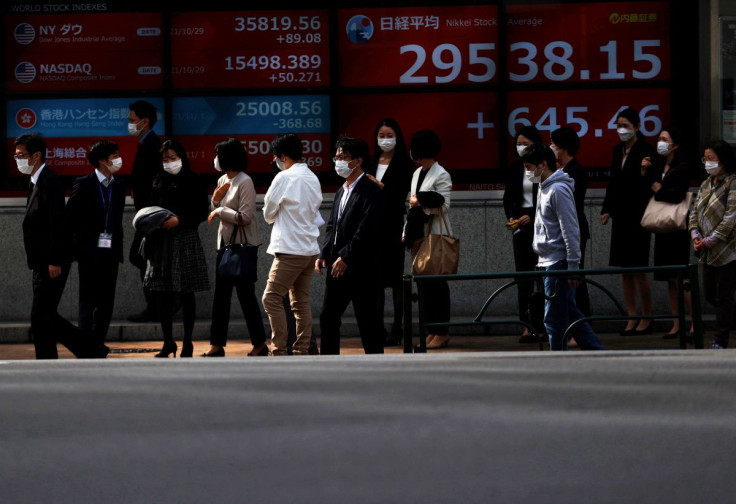Stocks Rise As Investors Await U.S. Jobs Data For Fed Cues

Asian shares were mostly higher on Friday as investors hoped U.S. jobs data due later might sway the Federal Reserve to slow its current aggressive pace of interest rate hikes over the coming months.
MSCI's broadest index of Asia-Pacific shares outside Japan was up 0.56%, riding a strong Wall Street close overnight. Japan's Nikkei was up 1.2%, and shares in Seoul were up 0.46%, while Australia's resource-heavy index was up 0.79%.
European STOXX 50 futures rose 0.76%.
Markets in China, Hong Kong and the UK are closed for public holidays.
Overnight, tech stocks led a rally on Wall Street, lifting the S&P500 1.84%, the Nasdaq Composite 2.68%, and the Dow Jones Industrial Average 1.29%.
On Thursday, the ADP National Employment Report showed U.S. payrolls rising at a slower-than-expected pace last month.
Investors are now looking to the U.S. Labor Department's comprehensive jobs report, due later on Friday, for confirmation of a slowdown in the employment market, which could convince the Fed to go slow on interest rate hikes for the rest of the year.
"For equities right now, anything that might be viewed as capping the Fed's tightening could be viewed as supportive," said ING's Asia head of research Rob Carnell.
"So, therefore, weak macro data becomes positive for stocks."
Economists expect about 325,000 jobs were added last month in the United States and reckon unemployment ticked lower to 3.5%.
"Any deviation from these figures that shows the labour market hanging together better than this might well be negative for equities and vice versa," Carnell said.
Inflation is the biggest worry for the Fed and global policymakers. Fed officials have said that U.S. interest rates would likely continue to be raised aggressively unless inflation moderates.
"Front-end rate hike pressure that had built the day prior on robust economic data immediately eased off after a weaker than expected May ADP employment print, suggesting things are cooling off," said Stephen Innes of SPI Asset Management.
Markets have locked in consecutive 50-basis-point Fed hikes in June and July but the dollar has been pushed around this week by uncertainty about what happens after that.
The U.S. dollar currency index, which tracks the greenback against six major currencies, was at 101.770, pausing a rally earlier in the week.
The yen has been kept under pressure by super-low interest rates in Japan, and was last steady at 129.80 per dollar, having lost 2% on the greenback this week.
U.S. Treasury yields were mixed ahead of the non-farm payrolls data.
The benchmark 10-year yield was at 2.9204% while the 2-year yield, which tends to be sensitive to U.S. rate expectations, was down at 2.6484%.
Oil prices were unchanged after U.S. crude inventories fell amid high demand, even as oil-producing countries OPEC+ agreed to boost production. Brent futures were at $117.17 per barrel, while U.S. West Texas Intermediate crude stood at $116.34.
To read Reuters Markets and Finance news, click on the state of play of Asian stock markets please click on:
© Copyright Thomson Reuters 2024. All rights reserved.







